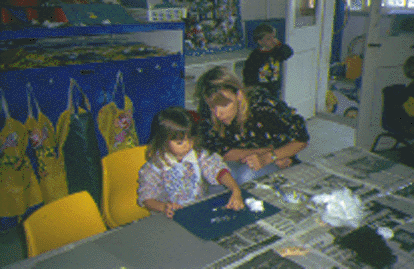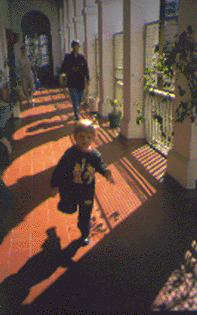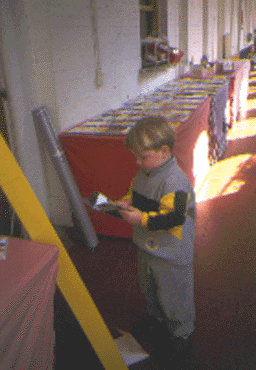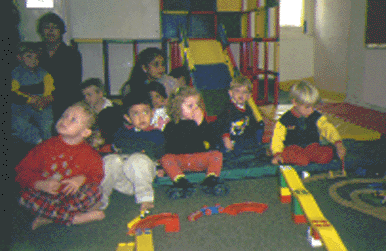Learning through playingInnovative educational methodBy Sally Tse Preschool education means not only kindergarten. It can be a fun world, too. The Hong Kong Preschools Playgroups Association provides an alternative to preschool education for children under 5. In these playgroups, the children are not taught the letters of the alphabet and arithmetic, but are asked to create an artwork using seashells, to draw a picture, or to construct a model. “An informal learning environment is provided for children. They are expected to learn by self-exploring. In the playing environment, the children touch and play with the materials provided. They are stimulated to learn to interact with the real world. Play is very important to them, just like work for adults.”
Photos by Sally TseCarrying out the principle of learning through playing is one of the two objectives of the Association. Said Mrs. Annells: “We aim at advancing the preschool education and social development of children who are below compulsory school age in a learning-through-playing environment.” The children are expected to be more active and more imaginative when they grow up. And they will have a good foundation on learning in the future under such learning approach. “In the long run, it also helps ensuring a better career path for the children, since they are more thoughtful on deciding which job will be most suitable for them,” Mrs. Annells continued.
“Unlike the common preschool approach in Hong Kong, we do not teach the alphabet or mathematics. But if the parents demand us to do so, we will carry out appropriate adjustment, like adding some academic content in our sessions,” said Mrs. Annells. The discipline in the playgroup is currently maintained by three full-time supervisors. If the children do something wrong, such as fighting with one another, the supervisors stop them and correct them immediately. Besides the playgroup for children, there is also a “Parent and Toddler” session. Parents can participate in these sessions. “Our second objective is to encourage parental involvement. We provide opportunities for parents to participate in learning-through-playing activities with their children,” said Mrs. Annells. She said parents serve as observers of their children. Research shows that children are more concentrated in their work when they are watched by adults. With higher concentration, their ability to learn is considerably improved. Sometimes parents and children are both involved. They may cooperate with each other, such as making a cake together. Parents can stimulate their children by giving advice.
This parental involvement is not only beneficial to the children, but also for the adults. Mrs. Annells said,“ In the parent-and-toddler playgroup, mothers can learn how to get along with their children correctly. Especially for first-time mothers, this is a very good chance for them to learn and practise.” However, Mrs. Annells stressed that the Association is not offering a substitution for parental care. They are not providing baby-sitting services, and they encourage the active involvement of parents in their children’s activities. A good example is that both parents and children participate in the Family Fun Day. “In Hong Kong, where the flats are usually rather small, most families have few big toys for their children. Therefore, we provide a spacious room with sufficient toys for the children to play freely and joyfully,” said Mrs. Annells. A 34-year-old member, whose name is being withheld on request, said she was satisfied with the “play philosophy”. She said that it was a far more vivid approach to learning for the children. She thinks the method of teaching in most of the preschools in Hong Kong is rather rigid for kids. She heard about the Association from a friend, who was also a member there. Then she joined it since she agreed with their philosophy.
“My child, who is now 3, likes to stay there very much and enjoys the environment,” she said. Mrs. Lui Sau Yan, principal of the Hong Kong Bethel Cideon Kindergarten, also said that the idea of learning through playing is effective in education. “It is a good concept since playing is an essential element in children’s development. They can learn more efficiently in a more relaxing environment. That’s why every kindergarten in Hong Kong is trying to merge learning and playing together,” said Mrs. Lui. However, Mrs. Lui said that only playing in preschool education is too ideal and cannot apply to the real world. “If the children have no basic academic knowledge such as the alphabet and numbers, they can hardly make an artwork or build a model. They should know at least some simple vocabulary and colour concepts first,” Mrs. Lui said. According to Mrs. Lui, it is incompatible with the Hong Kong educational system if she does not teach children academic subjects in preschools. “In primary schools, there is a lot of homework to do and things to learn by children. If they are addicted to a no-homework and no-study lifestyle, they cannot adapt to primary school education. “The idea of learning through playing is worth carrying out. But the
contents and the amount to be learned must be carefully designed. Also, the amount of time
the teacher is involved is also important,” Mrs. Lui added. More about HKPPA . . .The Association was originally a branch of the British Preschools Playgroups Association and was set up in 1979. In 1996, it separated from the British office and became a Hong Kong-based organization. The Association has about 1,450 families as registered members. The members are of different nationalities, including French, English, Taiwanese and Hong Kong Chinese. With a $250 annual membership fee, each member can join. |



